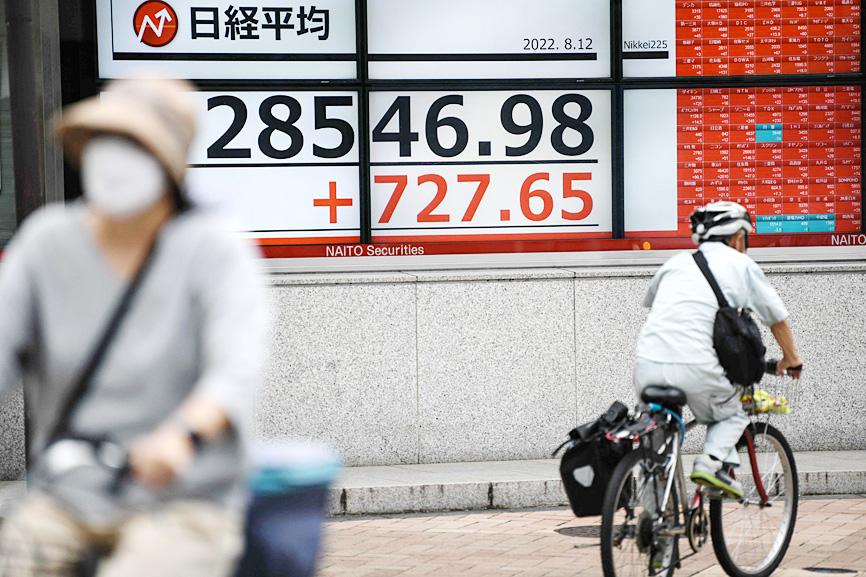Asian stocks just cannot catch a break. Fresh from being whipsawed by rising geopolitical tensions over Taiwan, they now face what is forecast to be the worst earnings season since the start of the COVID-19 pandemic.
Earnings per share for MSCI Asia Pacific Index members slid 16 percent in the three months through June from a year earlier, the steepest decline in eight quarters, analyst estimates compiled by Bloomberg Intelligence showed.
That contrasts with a 9 percent gain for companies in the S&P 500 Index even as the US economy edged toward a recession.

Photo: AFP
The prospect of dwindling profits adds to the negatives that have dragged the MSCI Asia Pacific Index down almost 16 percent this year, putting it on course for its worst annual performance since 2018.
These include China’s COVID-19 lockdowns — a key reason for the region’s poor earnings performance, a slowdown in the semiconductor cycle and political furor over US House of Representatives Speaker Nancy Pelosi’s trip to Taiwan.
While the Asian stock benchmark just capped a fourth week of gains as US inflation slowed, the durability of the recovery is already being questioned.
“All the elements are not in place for a sustainable up-move,” said Rajat Agarwal, an Asia equity strategist at Societe Generale SA.
Earnings have yet to enter a new cycle, geopolitical tensions will continue to be priced in and financial conditions remain restrictive, he said.
A slowdown in China is one of the major factors pushing down regional earnings, particularly as Chinese firms make up about 20 percent of the MSCI Asia gauge.
Profits for MSCI China Index constituents are expected to slide 12 percent in the June quarter from a year earlier, dragged down by COVID-19 curbs, a cratering in the property market and dislocated supply chains.
Weakness in export-oriented sectors such as semiconductors is also hurting.
Analysts have cut back estimates for South Korea’s semiconductor giants Samsung Electronics Co by 16 percent and SK Hynix Inc by 34 percent from their recent peaks, citing falling global demand for electronics such as mobile phones and PCs.
“What’s happening in the US and Europe, companies pulling back on investments, that to me is the burden on tech hardware earnings right now,” said Tai Hui (許長泰), chief Asia market strategist at JPMorgan Asset Management in Hong Kong.
Still, there are some positive signs for Asian stocks. A halt in the US dollar rally is encouraging fund flows into a number of markets this quarter, and global investors have boosted holdings of shares in the region’s emerging markets outside of China for four straight weeks, the longest streak since January, data compiled by Bloomberg showed.
Hui said he favors reopening plays in Southeast Asia in the tourism and retail sectors, while Eastspring Investments is joining other asset managers in recommending Chinese electric vehicle stocks.
M&G Investments has said improving earnings should help shares in India and Indonesia continue to outperform.
Others such as T. Rowe Price are more cautious, saying they are waiting for further signs of improvement in the world’s largest economies before turning optimistic about earnings in Asia.
“These are still early days and we have to watch trends in US core inflation and employment in the coming months to gain further confidence in the sustainability of these trends,” said Haider Ali, associate portfolio manager for the firm’s emerging markets discovery equity strategy in Hong Kong.

Vincent Wei led fellow Singaporean farmers around an empty Malaysian plot, laying out plans for a greenhouse and rows of leafy vegetables. What he pitched was not just space for crops, but a lifeline for growers struggling to make ends meet in a city-state with high prices and little vacant land. The future agriculture hub is part of a joint special economic zone launched last year by the two neighbors, expected to cost US$123 million and produce 10,000 tonnes of fresh produce annually. It is attracting Singaporean farmers with promises of cheaper land, labor and energy just over the border.

US actor Matthew McConaughey has filed recordings of his image and voice with US patent authorities to protect them from unauthorized usage by artificial intelligence (AI) platforms, a representative said earlier this week. Several video clips and audio recordings were registered by the commercial arm of the Just Keep Livin’ Foundation, a non-profit created by the Oscar-winning actor and his wife, Camila, according to the US Patent and Trademark Office database. Many artists are increasingly concerned about the uncontrolled use of their image via generative AI since the rollout of ChatGPT and other AI-powered tools. Several US states have adopted

KEEPING UP: The acquisition of a cleanroom in Taiwan would enable Micron to increase production in a market where demand continues to outpace supply, a Micron official said Micron Technology Inc has signed a letter of intent to buy a fabrication site in Taiwan from Powerchip Semiconductor Manufacturing Corp (力積電) for US$1.8 billion to expand its production of memory chips. Micron would take control of the P5 site in Miaoli County’s Tongluo Township (銅鑼) and plans to ramp up DRAM production in phases after the transaction closes in the second quarter, the company said in a statement on Saturday. The acquisition includes an existing 12 inch fab cleanroom of 27,871m2 and would further position Micron to address growing global demand for memory solutions, the company said. Micron expects the transaction to

A proposed billionaires’ tax in California has ignited a political uproar in Silicon Valley, with tech titans threatening to leave the state while California Governor Gavin Newsom of the Democratic Party maneuvers to defeat a levy that he fears would lead to an exodus of wealth. A technology mecca, California has more billionaires than any other US state — a few hundred, by some estimates. About half its personal income tax revenue, a financial backbone in the nearly US$350 billion budget, comes from the top 1 percent of earners. A large healthcare union is attempting to place a proposal before